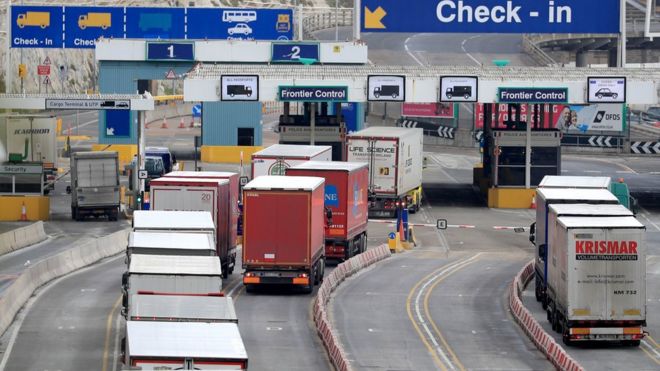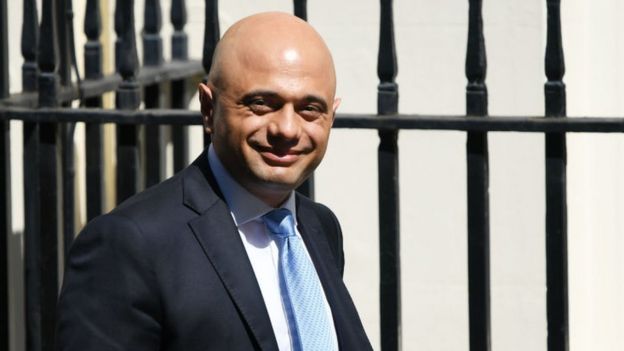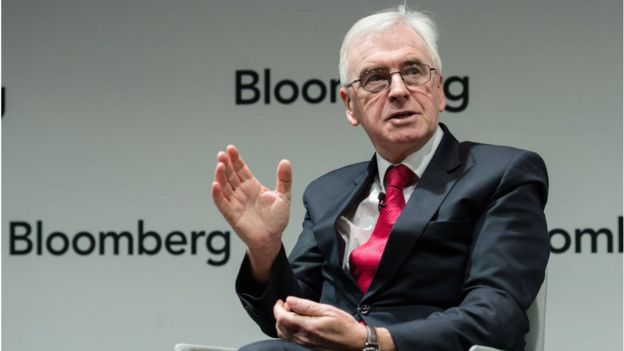 PA
PA
The government has announced an extra £2.1bn of funding to prepare for a no-deal Brexit - doubling the amount of money it has set aside this year.
The plans include more border force officers and upgrades to transport infrastructure at ports.
There will also be more money to ease traffic congestion in Kent and tackle queues created by delays at the border.
Shadow chancellor John McDonnell described the plans as "an appalling waste of taxpayers' cash".
The package also includes money for stockpiling medicines to ensure continued supplies and a national programme to help businesses.
"With 92 days until the UK leaves the European Union it's vital that we intensify our planning to ensure we are ready," said Chancellor Sajid Javid, announcing the move.
"We want to get a good deal that abolishes the anti-democratic backstop. But if we can't get a good deal, we'll have to leave without one.
"This additional £2.1bn will ensure we are ready to leave on 31 October - deal or no-deal."
The shadow chancellor said the extra money was "all for the sake of Boris Johnson's drive towards a totally avoidable no-deal".
He added: "This government could have ruled out no-deal and spent these billions on our schools, hospitals, and people.
"Labour is a party for the whole of the UK, so we'll do all we can to block a no-deal, crash-out Brexit."
"Turbo-charging" no-deal preparation is the energetic promise of the new Treasury, which under previous management had been accused by the now prime minister and his Brexiteer allies of dragging its feet on funding for such measures.
Some of this boost, however, is a repeat prescription for vital medicine supply - spending tens of millions again on reserving cross-Channel ferry capacity and for specialist warehousing and stockpiling that was not, in the end, required after the last Brexit deadline.
All this is designed to mitigate the anticipated freight gridlock around Dover and Calais.
But that is not entirely in the government's hands. Much depends on whether the French authorities choose to enforce full customs and health checks on freight from the UK.
The flow across the Channel also depends on the preparedness of many smaller traders, more than half of whom have not signed up to the most basic customs registration that will become mandatory for European trade under no-deal.
An advertising campaign will target this vital group. It will have to persuade them that no-deal is highly likely, even as the prime minister himself suggests the chances are vanishingly small.

Liberal Democrat treasury spokesman Chuka Umunna said the money was a "drop in the ocean".
"They promised us an extra £350m each week for the NHS, now they are making more money available just to ensure access to medicine."
Prime Minister Boris Johnson has previously said he is willing to take the UK out of the EU on 31 October - whether a Brexit deal has been agreed or not.
Former Border Force director-general Tony Smith said the extra money was a "step in the right direction" but more should have been done earlier.
"I don't understand why this wasn't implemented three years ago when the government knew we were leaving the European Union," he said.
 CHRIS J RATCLIFFE
CHRIS J RATCLIFFE
There could be a row over the pledge to spend such a vast sum on preparing for no-deal, given Boris Johnson's previous comment that the chances of this happening were a "million to one", said the BBC's assistant political editor Norman Smith.
Another contentious area will be the government's plan to spend around £130m on a huge public information campaign on advice and help for the event of no-deal, he said.
In comparison, David Cameron's decision to send leaflets to every household in the run-up to the 2016 Brexit referendum had a total cost of £9m.
Investment needed anyway?
Conservative peer Baroness Altmann, a former pensions minister, said: "This is huge amounts of taxpayers' money that is being spent on something the government itself has said will be hugely damaging to the British economy and to the British way of life."
But Chief Secretary to the Treasury Rishi Sunak insisted the latest funding was not a waste, even if the UK ended up leaving with a deal.
"A lot of the money we are spending is going to go on things that we would need to spend anyway because we're leaving the European Union," he told BBC Radio 4's Today programme.
"Investment in things like our ports, our border infrastructure... all of that is money we should be spending anyway for those new arrangements."
The new money consists of £1.1bn which will be provided to departments and devolved administrations immediately, while a further £1bn will be made available if needed.
This comes on top of £4.2bn, which has been allocated since 2016 for Brexit preparations by the previous chancellor, Philip Hammond.
 GETTY IMAGES
GETTY IMAGES
But not all of that money would have been spent on getting ready for a no-deal scenario.
The measures announced by Mr Javid include £344m to be spent on new border and customs operations.
This includes recruiting an extra 500 border force officers, in addition to 500 already announced, while there will also be more money for training customs agents and processing UK passport applications.
'Sceptical'
Another £434m will be spent on ensuring continuity of vital medicines and medical products, including freight transport, warehousing and stockpiling.
Of the rest, £108m will go on promoting and supporting businesses "to ensure they are ready for Brexit", including a national programme of business readiness and "helping exporters to prepare for, and capitalise on, new opportunities".
There will also be a public information campaign and an increase in consular support for Britons living abroad, at a cost of £138m.
Meg Hillier, chair of the Public Accounts Committee, said she was "sceptical about how much can be spent with the time available".
She said her committee had been told the UK was now past "the point of no return" for effective spending to mitigate the effects of no deal, adding: "My biggest question is how on earth can you spend that amount of money in time, how can you recruit and train border guards in the time available, 91 days, it's just not feasible."
No comments:
Post a Comment